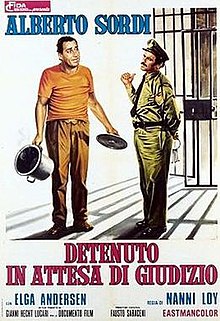In Prison Awaiting Trial
| In Prison Awaiting Trial (Detenuto in attesa di giudizio) | |
|---|---|
 Film poster | |
| Directed by | Nanni Loy |
| Written by | Sergio Amidei Emilio Sanna |
| Produced by | Gianni Hecht Lucari Fausto Saraceni |
| Starring | Alberto Sordi, Lino Banfi |
| Cinematography | Sergio D'Offizi |
| Edited by | Franco Fraticelli |
| Music by | Carlo Rustichelli |
Release date |
|
Running time | 102 minutes |
| Country | Italy |
| Language | Italian |
In Prison Awaiting Trial (Italian: Detenuto in attesa di giudizio) is a 1971 Italian drama film directed by Nanni Loy. It was entered into the 22nd Berlin International Film Festival where Alberto Sordi won the Silver Bear for Best Actor award.[1]
Plot[]
Roman surveyor Giuseppe Di Noi, who has lived in Sweden for many years and married a Swedish woman and respected professional, decides to take his family on holiday in Italy. At the Italian border he is stopped and arrested without any explanation. After three days in jail in Milan, he learns - through the efforts of a guard - that he has been charged with "manslaughter" of a German citizen. Giuseppe is deemed a "fugitive" and thus ineligible for house arrest; he is instead transferred from prison to prison until he reaches the imaginary town of Sagunto (near Salerno), where he gets placed in solitary confinement.
Di Noi undergoes a genuine judicial ordeal, full of humiliations. He is unwillingly involved in a riot, and as a result is transferred to a prison for inmates serving life sentences, and ultimately to a psychiatric facility. It takes the obstinacy of his wife, the passionate interest of his lawyer and the benevolence of the investigating magistrate otherwise on vacation, to arrive at a logical explanation.
While recovered at the hospital, Di Noi's lawyer learns about a highway viaduct Battipaglia-Matera - built years before by an Italian firm where he was employed as a surveyor - which collapsed and caused the death of a German driver in transit. The protagonist had subsequently moved to Sweden. Lacking international communications, he could not be notified a subpoena, and therefore technically became a fugitive. Even after regaining his freedom, Di Noi remains irrevocably marked by the ordeal, both physically and psychologically.
Cast[]
- Alberto Sordi as Giuseppe Di Noi
- Elga Andersen as Ingrid
- Andrea Aureli as Police officer
- Lino Banfi as Sagunto jailhouse director
- Antonio Casagrande as Judge
- Mario Pisu as Psychiatrist
- Michele Gammino as Don Paolo
- Tano Cimarosa as Prison ward
- Fulvio Mingozzi as Prison ward
- Luca Sportelli as Prison ward
- Gianni Bonagura as Lawyer Sallustio Giordana
- Silvio Spaccesi as Marshal
- Nazzareno Natale as Saverio Guardascione
- as Brigadier Saporito
- Mario Brega as Inmate
- Giuseppe Anatrelli as Inmate Rosario Scalia
References[]
- ^ "Berlinale 1972: Prize Winners". berlinale.de. Retrieved 16 March 2010.
External links[]
- 1971 films
- Italian-language films
- Italian films
- 1971 drama films
- Films directed by Nanni Loy
- Films scored by Carlo Rustichelli
- Films set in Italy
- Italian prison films
- Films about miscarriage of justice